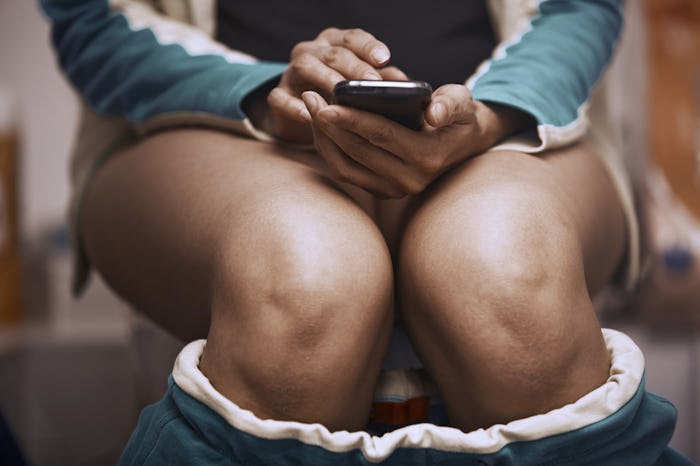Life

7 Weird Signs You're Not Peeing Enough
Have you ever had a day when you were super busy — rushing from meeting to meeting, picking the kids up from school or daycare, running to the grocery store, getting other errands and chores done — only to realize you haven't peed for hours? Certainly it's not just me. You probably don't normally pay a whole lot of attention to how often you pee over the course of a normal day, but you may actually be ignoring some weird signs that you're not peeing enough.
The exact number of bathroom breaks that you should take each day can vary based on a number of different factors. “There is no specified correct number of trips to the bathroom to urinate” in a given day, Elaine Hanh Le, M.D., tells Romper in an email, but “the more important thing to look at is whether there has been a dramatic change in the amount or frequency of urination or if the urination seems disproportionate to how much water you’re drinking.”
If you're suddenly going all the time or not at all, that could be a sign of some other underlying issues that warrant a talk with your doctor. Dr. Le recommends calling your provider “if you’re drinking at least 6-8 full glasses of water a day and only urinating 1-2 times a day and/or you feel like your urinary stream is very weak.”
There are a handful of other ways your body will let you know if you’re not urinating enough, too.
1Your Urine Is Bright Yellow
You've heard this one before: If your urine is brightly colored, you're dehydrated. As it turns out, while urine that is yellow, golden, or orange-tinted can hint at dehydration, according to WebMD, the color of your urine could also be affected by something you ate or a medication you took. Still, bright yellow or golden urine can point to the fact that you're not drinking enough water, as Dr. Gina Sam, director of the Mount Sinai Gastrointestinal Motility Center, told Elle, which probably also means you're not peeing frequently enough.
2You Get A UTI
If you regularly "hold it" rather than heading to the bathroom when you need to go, you could actually develop a urinary tract infection (UTI) or bladder infection (signs include cloudy urine, blood in the urine, and a burning sensation while peeing). Bladder infections can lead to further complications, too. “If you feel like you need to urinate but cannot fully empty your bladder and therefore aren’t urinating enough,” says Dr. Le, “there is a potential that you may have a blockage that is keeping the body from expelling the urine.”
3It Doesn't Take You Very Long To Go
How long it takes you to actually go can vary from person to person as well as from one trip to the bathroom to the next. So if you pee for longer or shorter than other people, don't worry too much. However, Dr. Benjamin Brucker, assistant professor of urology at New York University Langone Medical Center, told BuzzFeed Life that if you felt like you really needed to go and then it only took a second or two, it could be a sign of an infection.
4You Can't Go When You Want To
As Healthline reported, when you hold your pee "for 10 hours or more," you run the risk of developing urinary retention, which means that even when you desperately want to relieve yourself, the muscles in your bladder can't relax. Treatment for acute urinary retention often involves the use of a catheter so, you know, try not to hold your pee for more than 10 hours.
5You Go When You Don't Want To
Holding your pee for too long can cause your bladder to "stretch," as Health reported, and when that happens, residual urine has a way of leaking out when you're not expecting. Interestingly enough, going to the bathroom too often can result in an "overactive bladder," so you really want to strive for moderation here.
6You're Not Peeing After Sex
Why is it important to pee after sex? As the aforementioned BuzzFeed article reported, bacteria naturally found in the vagina can get pushed into the urethra and up towards the bladder during sex, which could cause an infection if left alone. Peeing after sex can help flush the bacteria out and prevent a UTI or bladder infection. So, in other words, if you're not peeing after sex, you're not peeing enough.
7You Feel Dehydrated
“Very low frequency of urination could be a sign that you’re not drinking enough liquids and therefore not producing very much urine,” says Dr. Le, “If you’re not careful, you could risk becoming dehydrated, particularly during the hotter months of the year.” Staying hydrated keeps you physically and mentally healthy, so if you haven't peed in a while and you're feeling sluggish, tired, or thirsty, grab that water bottle and fill it up.
Although these signs that you aren't peeing enough may be solved simply with drinking more water, if you're concerned, it's better to talk to your doctor than to ignore it. Dr. Le also notes, “During all of this, if you’re [also] experiencing general signs of feeling ill, such as symptoms of severe weakness, lightheadedness, dizziness, confusion, fever, or chills, then you should seek medical attention.” Your body relies on adequate hydration and lots of fluids and peeing is one way your body excretes things you don't need, so going often enough is important for your overall health.
Expert:
Elaine Hanh Le, M.D., Chief Medical Officer at Healthline Media
This article was originally published on